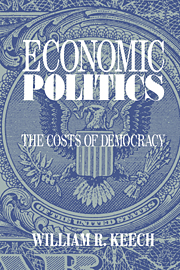Book contents
- Frontmatter
- Contents
- List of figures and tables
- Preface and acknowledgments
- INTRODUCTION
- 1 Macroeconomic Politics and the Costs of Democracy
- 2 Macroeconomic Theories and Their Political Implications
- MODELS OF ROUTINE POLITICS
- THE SOURCES AND AUTHORITY OF MACROECONOMIC GOALS
- INSTITUTIONS AND PROCESSES
- CONCLUSION
- References
- Index
2 - Macroeconomic Theories and Their Political Implications
Published online by Cambridge University Press: 05 June 2012
- Frontmatter
- Contents
- List of figures and tables
- Preface and acknowledgments
- INTRODUCTION
- 1 Macroeconomic Politics and the Costs of Democracy
- 2 Macroeconomic Theories and Their Political Implications
- MODELS OF ROUTINE POLITICS
- THE SOURCES AND AUTHORITY OF MACROECONOMIC GOALS
- INSTITUTIONS AND PROCESSES
- CONCLUSION
- References
- Index
Summary
An advantage of using the lens of macroeconomic issues through which to view democratic practice is that there is a large body of macroeconomic theory. This theory derives from the effort to understand the way the economic world works, to explain and predict, and to know what is possible and what is not. For better or worse, the unmistakable message of this chapter is that there is no single, uncontested theory of the way the macroeconomic world works. That means that political disagreement about economic issues is likely to involve differences of opinion and belief about what is realistic and feasible, as well as about what is desired. This chapter shows how macroeconomic theory is, in a sense, political theory.
POLITICAL ECONOMICS AND ECONOMIC THEORY: THREE QUESTIONS
Economic theory is the source of our most authoritative understanding of the way the macroeconomic world works, and there is an impressive body of such theory. As such, it seeks to identify what is possible; it seeks to identify the consequences of alternative courses of action; and it “defines the norms that determine when certain conditions are to be regarded as policy problems” (Majone, 1989, pp. 23–4). But macroeconomic theory does not speak with one voice. There are competing theories, deriving from competing systems of belief about the way the world works. We shall review a sequence of these theories with an eye to their answers to the following three questions:
Does the economy regulate itself?
The answer to this question is fundamentally important, because it has obvious implications for the roles of public officials and for the issue whether government should take an active or a passive stance toward economic stabilization.
- Type
- Chapter
- Information
- Economic PoliticsThe Costs of Democracy, pp. 22 - 44Publisher: Cambridge University PressPrint publication year: 1995



